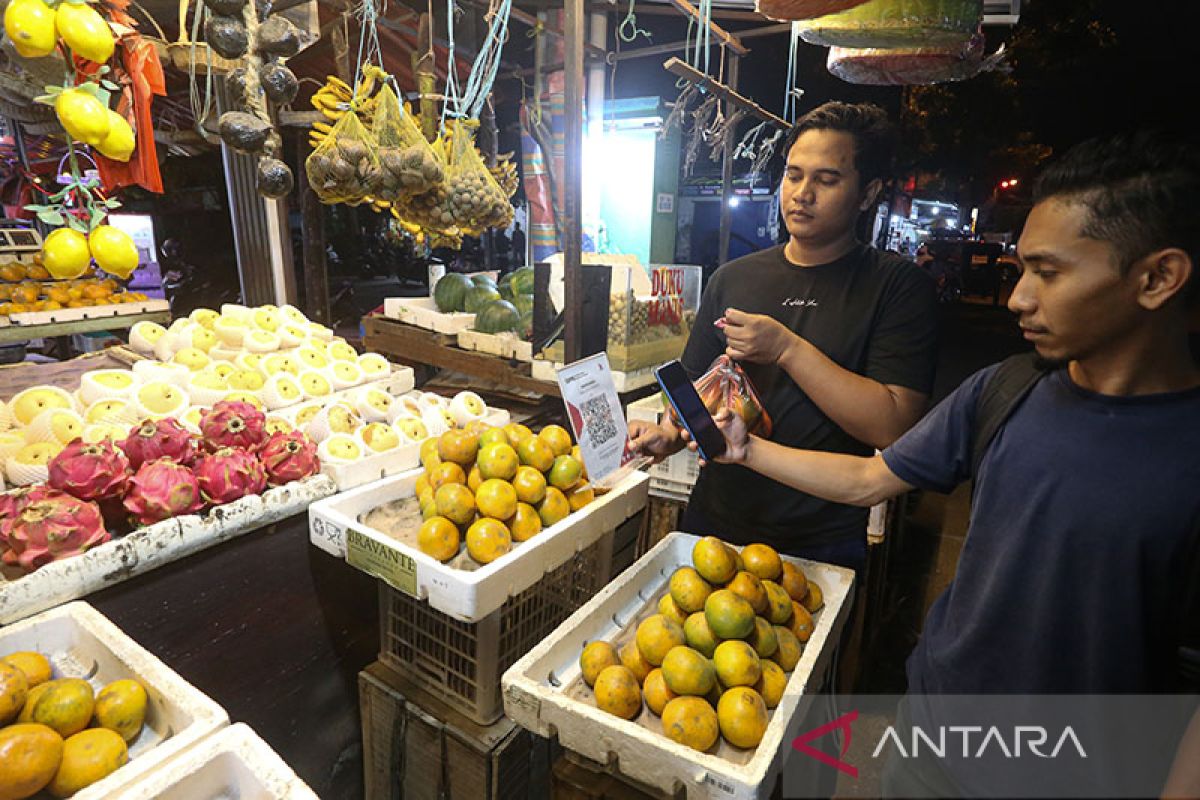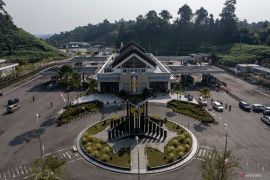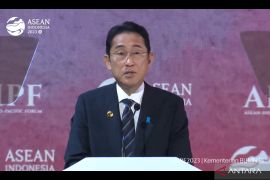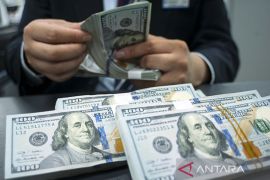Jakarta (ANTARA) - The government has been intensively promoting digital transformation in finance, which, apart from offering convenience to the people, would also help Indonesia compete with other emerging economies such as Malaysia and India.
The Ministry of Communication and Informatics has projected that the value of Indonesia's digital economy will reach US$360 billion in 2030.
Data from many sources has shown that Indonesia has managed to emerge as one of the ASEAN countries with a high potential for growth in terms of its digital economy.
Based on a study carried out by Google, Temasek, and Bain & Company, Indonesia's digital economy reached US$77 billion in 2022, reflecting growth of around 22 percent.
Currently, Indonesia has managed to become a main player in ASEAN's digital economy because around 40 percent of ASEAN's total digital economy transactions are from Indonesia.
The COVID-19 pandemic, which has forced people to adapt to technologies, can be said to be one of the stimuli of the digital transformation in finance.
According to Coordinating Minister for Economic Affairs, Airlangga Hartarto, Indonesia's potential is also supported by the demographic dividend, the presence of startups, and the country's Internet penetration, which reached 76.8 percent in 2022.
However, a complete digital transformation in finance is not an easy thing to achieve. Low financial literacy among people has become the main challenge currently.
Data from the Financial Services Authority (OJK) pegged the financial literacy index of Indonesians at 49.68 percent in 2022. Meanwhile, OJK recorded that the financial inclusion index reached 85.10 percent the same year.
Therefore, there is a gap of 35.42 percentage points between the financial literacy and financial inclusion levels.
Deputy secretary general II of the Indonesian Fintech Association (Aftech), Firlie Ganinduto, noted that people's financial literacy is still quite low. The gap between financial literacy and inclusion shows that Indonesia still has not reached an ideal digital economy transformation yet.
Besides, digital infrastructures are not yet equally distributed across regions in the country—an issue that the government needs to resolve.
Based on data from the Ministry of Communication and Information, 84.9 percent of a total of 83,218 villages in Indonesia have been connected to the Internet.
Meanwhile, 15.1 percent or 12,548 villages do not yet have adequate Internet access. The majority (73 percent) of villages that have not been reached by digitalization are those in underdeveloped, frontier, and outermost (3T) regions.
President Joko Widodo said that digital equity is one of the keys for Indonesia to realize the digital economy transformation and tackle the socioeconomic gap.
Indonesia has a big potential in the digital economy. Thus, the development of digital infrastructures in the country is necessary.
Regulation and collaboration
To face the challenges, the government is currently collaborating with stakeholders to make various efforts, ranging from improving financial literacy to achieving digital infrastructure equity through various policies and programs.
Deputy for the Coordination of Employment, Digital Economy, and MSMEs at the Coordinating Ministry for Economic Affairs Mohammad Rudy Salahuddin said that the Communication and Information Ministry is one of the ministries that have initiated several programs to support the digital economy.
Those programs include Indonesia's Digital Literacy program, Digital Talent Scholarship, and Digital Leadership Academy.
The Coordinating Ministry for Economic Affairs has also contributed through the development of virtual reality (VR)-based learning materials for vocational schools (SMK) through Technical and Vocational Education and Training (TVET) System Reform.
So far, the program has been tested at 16 SMKs and 7 provinces. In addition, 285 teachers have also received VR-based training.
Furthermore, Bank Indonesia (BI) has conducted programs for education and training on digital payment systems for the community, one of which has been realized through Leading Indonesia's Financial Literacy (LIKE IT) program.
LIKE IT is an interactive program for building financial literacy. The program is a result of collaboration between BI, the OJK, Finance Ministry, and Indonesia Deposit Insurance Corporation (LPS).
BI also regularly publishes educational materials such as guidelines for using digital payment systems, articles, and infographics, which are distributed through its website, social media, and other campaigns.
Fintech companies are also supporting the digital finance transformation in Indonesia.
Ganinduto said that three efforts have been made by fintech companies to support the digital transformation.
The first is providing support to the National Economic Recovery (PEN) program by using digital platforms owned by fintech companies, for example, the disbursement of People's Business Credit (KUR) through e-wallet.
Second, Aftech is supporting the National Research and Innovation Agency (BRIN) in creating digital talents.
Third, Aftech is also supporting the transformation of Regional Development Banks (BPD) for the application of 20 types of business models within BPD.
Furthermore, insurance companies are also taking part in educating the community. For example, insurance company AXA Mandiri, through the Healthy Community Movement (GERMAS), is providing knowledge, including in financial planning and training, to micro, small, and medium enterprise (MSME) players.
At the international level, the government has voiced the issues of literacy, financial inclusion, and technology utilization to make transactions faster at the 2023 ASEAN Summit.
Director of ASEAN Economic Cooperation at the Ministry of Foreign Affairs, Berlianto Situngkir, said that local currency transactions (LCTs) became the main focus of discussion at the meeting as part of an effort for improving economic connectivity in the region.
It also discussed ways to maintain financial stability in the region with LCT and the regional payment connectivity mechanism to strengthen integrity in the region.
In an effort to achieve equitable digital infrastructure, the Communication and Information Ministry, through its Telecommunication Accessibility Agency (BAKTI), has continued the project of establishing 7 thousand 4G base transceiver stations (BTS), especially in underdeveloped, frontier, and outermost (3T) regions by 2024.
Indeed, the digital ecosystem will be able to make people's life easier. Nevertheless, progress and collaboration of many parties as well as effective regulations from the government are needed so that the digital transformation in finance does not only remain a dream.
Related news: Form inclusive digital financial ecosystem: VP to stakeholders
Related news: Ministry aims to help 24 mln MSMEs join digital ecosystem
Related news: Digital economy positively impacting tourism, creative economy actors










